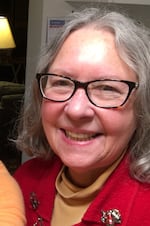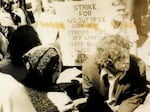In the spring of 1970, the Portland State University campus had been a hive of anti-Vietnam War activity for months. But things got hot on May 11 when Portland Mayor Terry Schrunk ordered police to forcibly remove protesters from a collection of tents and makeshift barricades in the Park Blocks. About 30 demonstrators were injured. This was just a week after national guardsmen opened fire on students during an anti-war demonstration at Kent State University in Ohio, killing four and wounding nine others.

People at “Fort Tricia Nixon,” during the Portland State University strike in Park Blocks, May 11, 1970.
City of Portland (OR) Archives, AP/56769
Cathy Wood Wyrick was a graduate student at the time. She was part of the group that organized much of the protest activity on campus.
She spoke with “All Things Considered” host Geoff Norcross about the events of that spring, and how they compare to the recent pro-Palestinian demonstrations on campus.
This conversation has been edited for clarity and length.
Geoff Norcross: What do you remember about that time when the police got more forcibly involved in the activity on campus?
Cathy Wood Wyrick: On that particular day, I heard this melee, this horrible noise outside in the Park Blocks. I lived right there. I ran out the door, looked up the Park Blocks and there were people running at me and they were screaming, they were crying; There were all these police milling around and they had riot batons and their big helmets and everything, and would beat people up and drag them. Of course, it was horrifying and shocking because we were a college campus.
Norcross: And when you first heard about the recent pro-Palestinian demonstrations on campus, what went through your mind? Did they bring up memories of that time?
Wood Wyrick: Yes it did, because the scale of the student protests were pretty much similar. There hasn’t been this number of campus protests for a long time. And it’s the same time of year. The weather was kind of raining last week, and when the strike was going on, it was kind of raining and foggy. It’s not the best memories in the world to bring back.

Cathy Wood Wyrick is a Portland State University graduate. She was part of the group that organized an anti-Vietnam War student strike in 1970.
Courtesy Cathy Wyrick
Norcross: What do you think your demonstrations in May of 1970 and the ones happening now have in common?
Wood Wyrick: Well, they were looking at a war mostly, and they were trying to think about injustice around the world and what the United States’ role in that was. But it was all keyed off by war.
Norcross: How do you think they’re different?
Wood Wyrick: I think we were more organized. But partly we were more organized because our particular war had been going on for six years at that point. And so there had been many demonstrations before. We were also really focused on non-violence and we had been influenced by the civil rights demonstrations. We’d all grown up watching Martin Luther King and everybody in the South and non-violent protest.
Norcross: There’s another thing that I see as a difference. While you were directing your ire outwardly, at the government and at the Ohio National Guard for what happened at Kent State, these current demonstrations are about the war in the Middle East, but they’re also focused on PSU itself and how it supports Israel through the investments of its endowment. I’m wondering what you think about the effectiveness of these actions.
Wood Wyrick: Well, back then, PSU didn’t have any endowment. It was all funded by state money. And so this is kind of a new thing. I think the whole idea in focusing on endowments and divestment goes back to anti-apartheid in South Africa issues a few years ago. And there’s also been some divestment movements having to do with climate change. But it’s a new way to protest.
Norcross: After the police came through the Park Blocks in 1970, thousands of Portlanders took to the streets in protest. There was this big march downtown to city hall, like 3,500 people. Obviously, that didn’t happen last week. I’m wondering why not. And I’m wondering what you think is different now.
Wood Wyrick: Well, I think the PSU student body was pretty united in their horror at what the police had done. They weren’t necessarily in favor of the strike. They were just against attacking students in an unprovoked way. And the thing is, what we were doing was non-violent direct action. We weren’t trashing things, we weren’t spray-painting things. We wanted to focus on our message.
Norcross: I’m wondering if the experience of the past couple of weeks has affected your thinking about students and student activism, and the role of universities in the debate, whatever the debate may be right at the moment.
Wood Wyrick: Well, I think the university should be at the center of the debate because that’s the whole point to me of having a university, to be able to talk about really tough issues in a safe kind of space. That’s the whole idea of having a university, to me. So I hope that doesn’t get lost in all of the turmoil that’s going on right now.
Click on the audio player above to hear the whole conversation.





